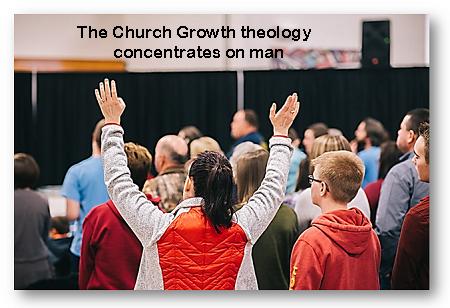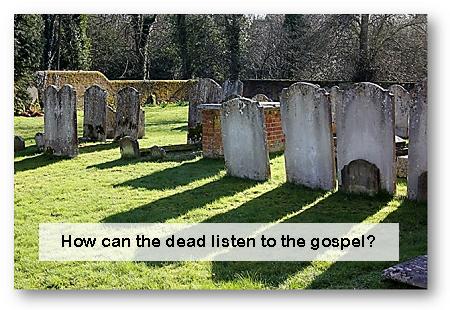Relevance of 'Calvinism' for the Church Growth and Expansion in the Modern World
Relevance of 'Calvinism' for the Church Growth and Expansion in the Modern World
Who would listen to what a slave-girl has to say to her mistress in the kitchen? God willing, those words will reach the king’s palace. God made Naaman believe: the man who was not even looking for Him.
2 Kings 5
Do the reformed doctrines present a solid foundation for church growth in the XXI century?
Definition⤒🔗
By Calvinism, I do not mean the personal opinions of Calvin, however much he was able to contribute to the understanding of the gospel; I mean the reformed conviction, as it resulted from the re-discovery of the gospel in the time of the Reformation, and particularly that, which has been recorded in the Canons of Dort.
By church growth, I mean growth because outsiders come to faith, are converted, and join the congregation.
I will deal with the question of what the reformed doctrines mean in connection with church growth in the 21st century under three headings.

1. Typifying our Times←⤒🔗
Modernism to Post-modernism←↰⤒🔗
In our times, we are dealing with a development from modernism to post-modernism. The modernist believed in progression, and in an objective and general truth. From science in particular, much was expected. For the church, this often meant dealing with an arrogant rejection of the faith in God as Creator, appealing to so-called scientifically established facts and statements. In conversations, the invitation of the gospel was often parried with: “Prove to me that God exists!”
Post-modernism saw a change in this. The haughty belief in the certainty that science offered, against the appeal to God’s revelation, seemed to become a lot less certain. It became meaningless to speak of an objective truth and this affected hermeneutics as well. The strict distinction between subject and object, which is typical of the modern way of thinking, can no longer be maintained. The impression that a text makes on someone can differ from one day to the next: the text will have a different meaning for everyone. Some hermeneutic scholars took this even further, up to the denial of the objective truth. What is true for you, does not necessarily have to be true for me; there is no general truth, there are, at best, (individual) truths.
Experience←↰⤒🔗
We encounter this pluralistic, relativistic culture in attempts to spread the gospel in this day and age. We meet people who are often no longer interested in what is true. What appeals to people is not what is presented as truth, but what experiences your faith brings. People tell us that we must not believe that everyone should adopt our conviction. Others should be allowed to stick to whatever they get their support from, irrespective of whether or not that conviction is true; whether or not it corresponds to an objective reality. Religion is relegated to one’s private life. The man to whom we bring the gospel in the 21st century, is usually very sympathetic towards religion, much more so than a few decades ago. Religion is ‘alright’, but only as long as it is presented as a personal conviction and experience.

New Testament Situation re-emerges←↰⤒🔗
D.A. Carson rightly comments, that the New Testament can be more directly applied to us than 50 years ago. From the beginning, the young church of the New Testament had to deal with a pluralism of religions and cultures. The absolute and exclusive claims of the apostolic epistles appeal to us especially. While others recognize many “lords” and a wide variety of hopes, Christians recognize one faith, one baptism, one hope, one Lord, one God. And Paul is prepared to pronounce his solemn “anathema’ on those who preach some other gospel. For the authors of the New Testament, there is no difference between the pluralism and the idolatry of those times. Therefore, we have to deal carefully with the greater prominence that our contemporaries give to faith. By faith, they actually mean religiosity.
Pluralism←↰⤒🔗
If we look around us, it is not difficult to notice certain effects of pluralism.
Think of the pleas for dialogue with other religions, and the assertion that salvation is also possible in other religions, apart from Christ; giving up believing in the Lord Jesus as the only way and the only truth and the only mediator; the reluctance to use church discipline; undermining the seriousness of the biblical message concerning the last judgment, by introducing a doctrine of a possible conversion after death; also by doubting or even denying an eternal judgment.
God’s View←↰⤒🔗
God’s revelation of Himself is the total opposite of this way of thinking.
The creation of man in God’s image sets man apart from the rest of creation. God gave us the capacity to know Him intimately. The fact that we are created, also holds us responsible. Not to acknowledge that we are dependent on God, is already anarchy in itself. Sin meant our total decay. Modern man recognizes the evil in the world, but does not see it in relationship to God and therefore he does not acknowledge guilt towards Him who made us. He does not know God as the personal, transcendent and sovereign Lord.
We do not do our neighbors any favor by adjusting the teachings of the Scriptures to the way of thinking in our times. The reformed confession can help us to continue the preaching of the Truth of God.
2. Ideas on Church Growth←⤒🔗
When we look around us in Europe, we see the devastating effects of secularization.
Let us just in all honesty admit that the spreading of the gospel through mission and evangelization is an enormous task for the church (Math. 28). But to bring that into practice is hard and often disappointing for us.
Techniques←↰⤒🔗
If we look at how other Christians spread the gospel, we see that, in many cases, man is put in a central position. In evangelistic television-services, it is often the person who preaches the gospel who has to make the show appealing by his appearance, his personality and his eloquence.
In mass-meetings you can see what the use of organizational skills — by telling a story about a conversion, a testimony. Much is done to create a pleasant atmosphere, and to be appealing so that people feel happy and are being entertained.
Sometimes, the tension which is created in meetings has to lead to deep emotion when people present, decide to give their lives to Jesus.
In Pentecostal churches, a lot of attention is given to the suffering of man, with the promise that Jesus came, not only to free us from sin, but also from disease and other evil. That evil comes from the devil, and from God there is only goodness, so you can claim health and prosperity from Him. Those with a lot of faith, have a lot of success.

There is also a renewed interest in signs and miracles. Attempts are made at reaching the non-believing neighbor especially by way of emotions and the experience of miracles.
The Church Growth theology, also concentrates on man. The doctrine of God’s double predestination is dismissed and in its place one states that God loves all people on earth the same. God wants to save all people. Although, in the Church Growth movement one also recognizes that God does make a certain selection. He does this on the basis of the ‘responsiveness’ of man. He has a preference for ‘winnable people’. The biblical doctrine of election has been altered to the conviction that God concentrates on the ‘responsive elements of society’. It is our duty to find the ‘winnable people’ and tell them of the gospel. Especially in that category we should present Jesus Christ in the power of the Holy Spirit. Then, people will come to belief in God.
There are many other ideas on church growth in our time. Think of people like Bill Hybels (Willow Creek). There are all kinds of concepts for building the congregation and making it grow (often putting into practice the correct notion that spreading the gospel is a task of the church community as a whole, and that it is necessary therefore, to mobilize the whole church for evangelistic purposes).
My reservation to the above mentioned approaches has to do with the fact that it is exactly from those quarters that the reformed doctrine is often principally dismissed, because it is said to be infertile to evangelization.
3. What does the Reformed Doctrine Stand for in this Context?←⤒🔗
When we think about our task to spread the gospel, we should start with God. It is about Him, from whom, through whom and to whom are all things (Rom. 11: 36). All preaching of the gospel has its starting point in Him, who decided to save sinners through His Son. God the Father made that decision to save. The Son gave himself to make it possible. The Holy Spirit ensures that people are actually saved, by means of hearing the gospel, through faith and conversion. Everything finds its origin in God’s eternal decision (the pactum salutis), is made possible by God and leads towards the goal that He set.
The preaching of the gospel does not start with us. It is God who sent his Son out of love. And it is the Son who continues the mission by giving orders to his apostles. They are sent out to the nations, to preach the gospel, to make them his disciples, to baptize and to learn to keep everything that the Lord of the church commanded. Christ makes this possible by pouring out his Holy Spirit in the church. The work of the apostles, therefore, continues through the church. Not only through the ministers, but by mobilizing all believers. The Spirit of Pentecost makes a prophet out of every believer, in order to confess the name of Jesus in the world.
This Preaching does not have an Uncertain Ending←↰⤒🔗
God predestined who would be brought to faith with power, through the gospel.
Paul writes to the Ephesians that God chose us in Christ before the world was created, to be holy and blameless in his sight. He predestined us to be adopted as his sons through Jesus Christ, according to the purpose of his will.
When He sent his Son into the world, with the task to lay down his life, and take it up again, this was not just to generally give the possibility of salvation. Christ came to lay down his life, not generally for those who would voluntarily choose Him, but for His sheep: for those whom the Father decided to give to Him.
Only this doctrine of God’s sovereign election gives us the courage we need. Without this blessed assurance we would give up!
When we explain the importance of the work of the Lord Jesus, and invite non-believers to put their trust in Him, it is like telling someone who died to get up.
Act of God←↰⤒🔗
That is what God tells us we are: dead in our transgressions and sins (Eph. 2: 1-3). An unspiritual person will not accept the things that come from the Spirit of God (1 Cor. 2: 14). The sinful mind is hostile to God. It does not submit to God’s law, nor can it do so (Rom. 8:7).

How can the dead listen to the gospel? And how can God’s enemies start to love Him? This can only happen when God Himself allows the gospel to come into someone’s heart with such a power, that it opens the heart and he is truly resurrected from the grave.
Actually, every Christian should admit this as soon as he starts to pray. When he gives thanks for his own salvation and prays for the conversion of those who do not believe yet, he recognizes that faith is something to be granted by God. He recognizes the truth in Ephesians 2:8, 9: “For it is by grace you have been saved, through faith - and this not from yourselves, it is the gift of God.”
And He does not give this Gift to Everyone←↰⤒🔗
He gives it to those He chose, in His sovereign pleasure. In accordance with the plan that He already made before the creation of the world. “He chose us in him before the creation of the world to be holy and blameless in his sight.” (Eph. 1:4).
We cannot understand Him in this (Isaiah 55:8), nor call Him to account (Rom. 9:20). We can only worship Him for the miracle that He was willing to choose us, while He did not find any reason for this within us. This gives us reason enough to be eternally thankful. And He told us, that the ones He chose, the church that He will bring to glory, form a great multitude, which cannot be counted, from every nation and race and tongue.
Courage←↰⤒🔗
This gives us the courage to spread the gospel anyway. And not to shy away from something that seems impossible. When we tell the Truth, He can give our words so much power through his Holy Spirit, that the wall of resistance against Him will crumble. He opens the closed and softens the hard heart. He makes the will, which was dead, alive, which was bad, good. He does this through his Spirit (Canons of Dort iii/iv, 11). And for this He makes use of the gospel, which he commanded us to preach everywhere. He gives us his Holy Spirit. And He commands us to bring forth fruit in the power of the Spirit; also in the loyal preaching of the gospel. In the seeking of that which is lost, filled with love. And in the hard work to the honor of our king. For: “in a multitude of people is the glory of a king” (Prov. 16:28).
Let the promise of the gospel be heard universally and without discrimination to all people, telling them, that whoever believes in Christ who was crucified, will not die, but have eternal life. This gospel should be preached with the command to repent and believe (Canons of Dort ii, 5). Christ himself is in the centre, calling: “Come to Me”.
The apostle says boldly, the elect obtained it, and the rest were blinded. Christ’s sheep will hear his voice, and if any will startle away, let them go...
In most cases where we preach to those who are not yet familiar with Christ, we would probably not start with election. If we use the image of a house where people will find salvation, then its foundation is Gods decision to elect and its door is Christ. We will first show people the door and invite them to go in through it. We will not ask them to think by themselves whether or not they belong to the elect, but we will tell them to put their trust in the Lord Jesus. In Him they will then find the assurance of their election. (Compare R.B. Kuiper, p. 44)
This gospel provides courage to work at spreading the gospel in the 21st century: God is faithful, his plans do not fail.

Add new comment